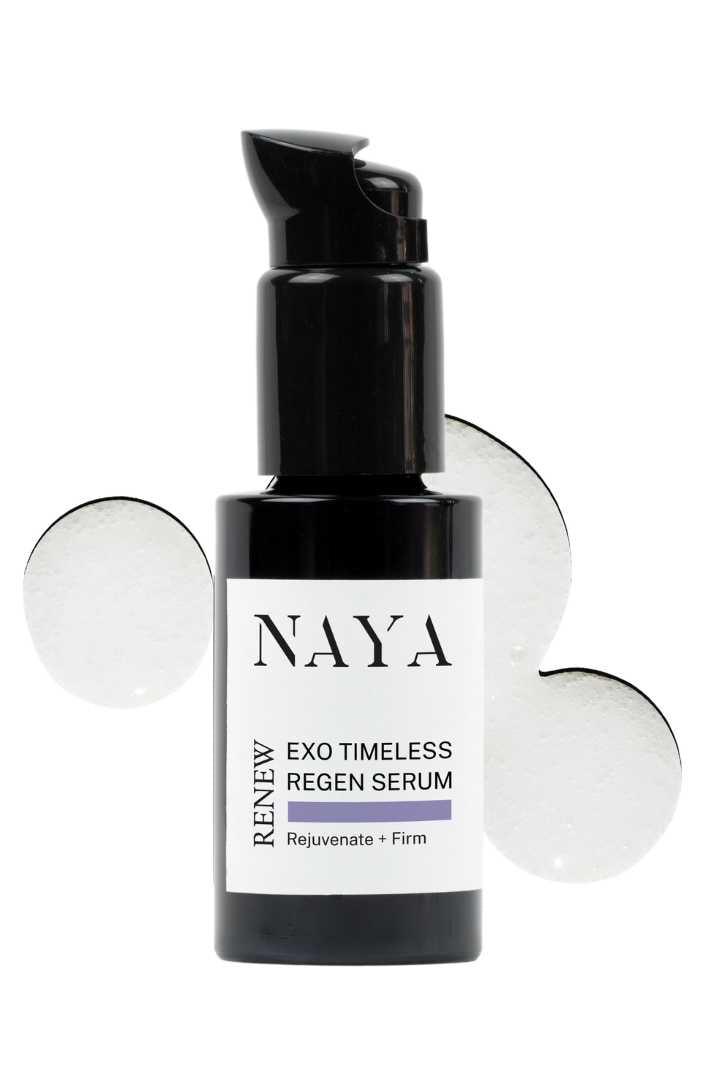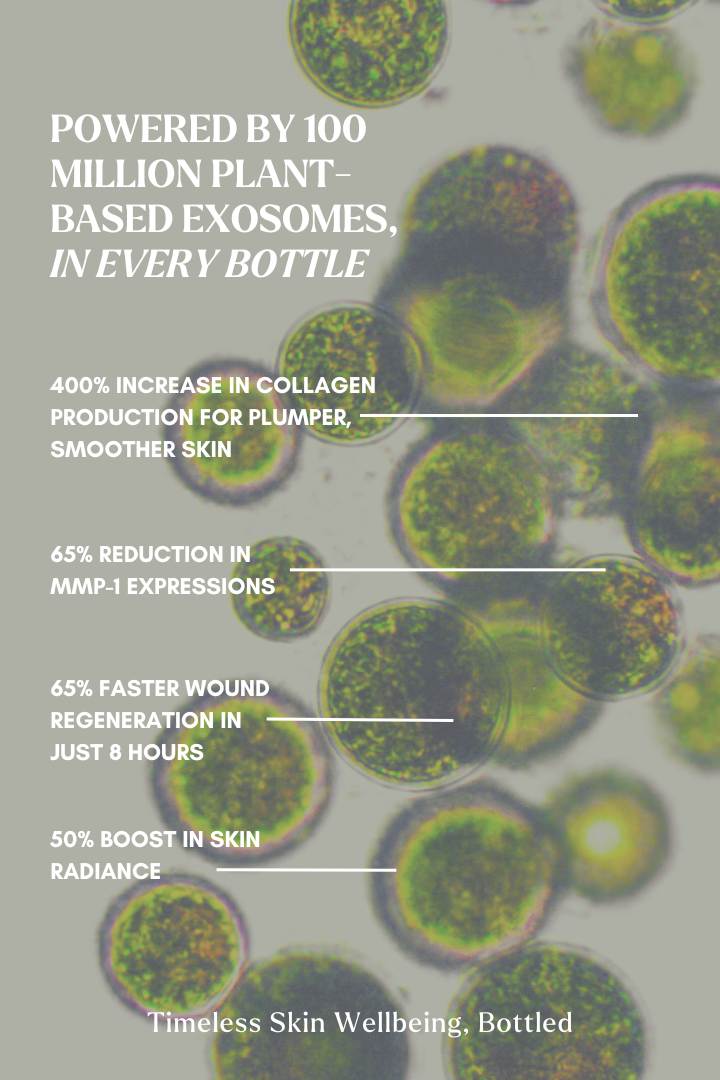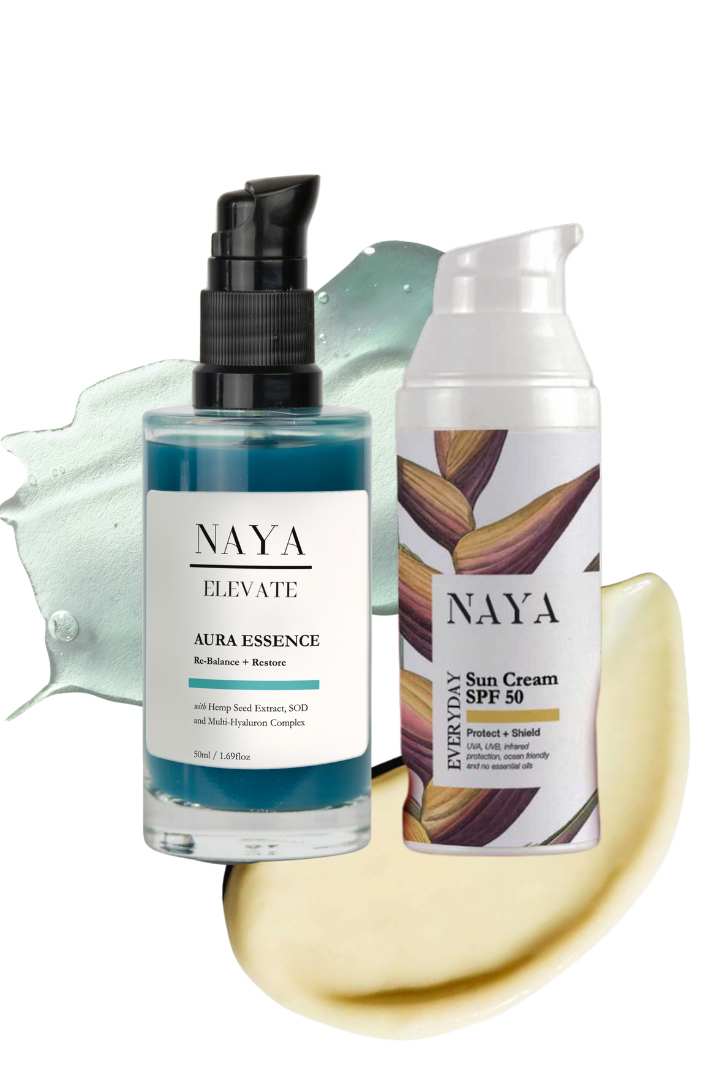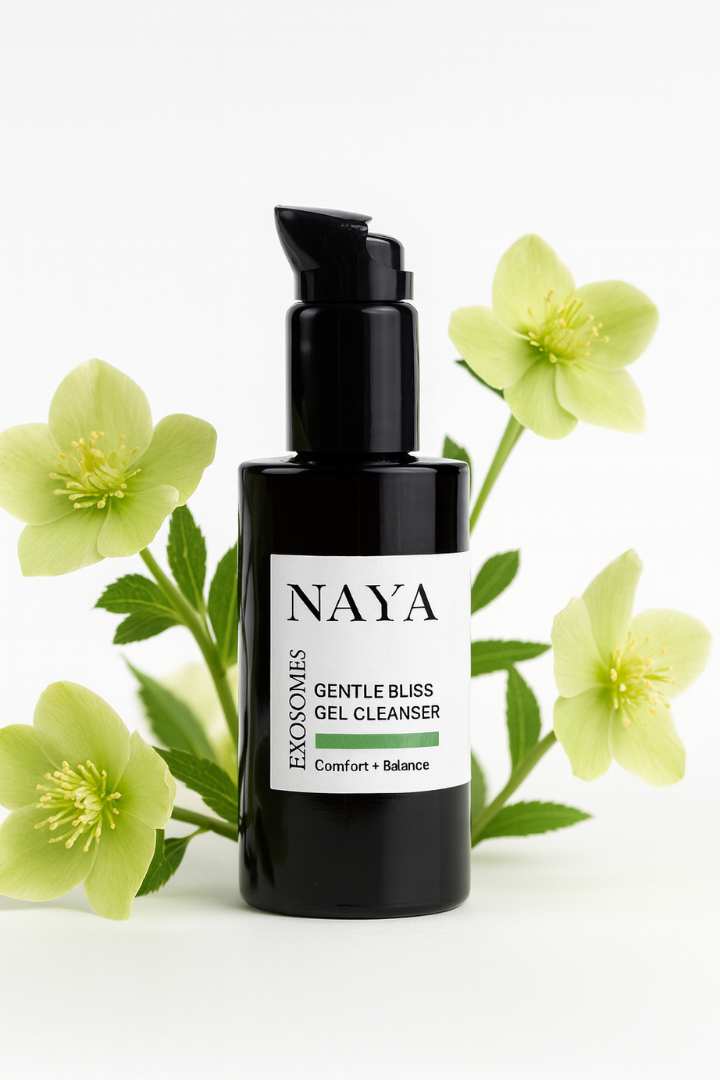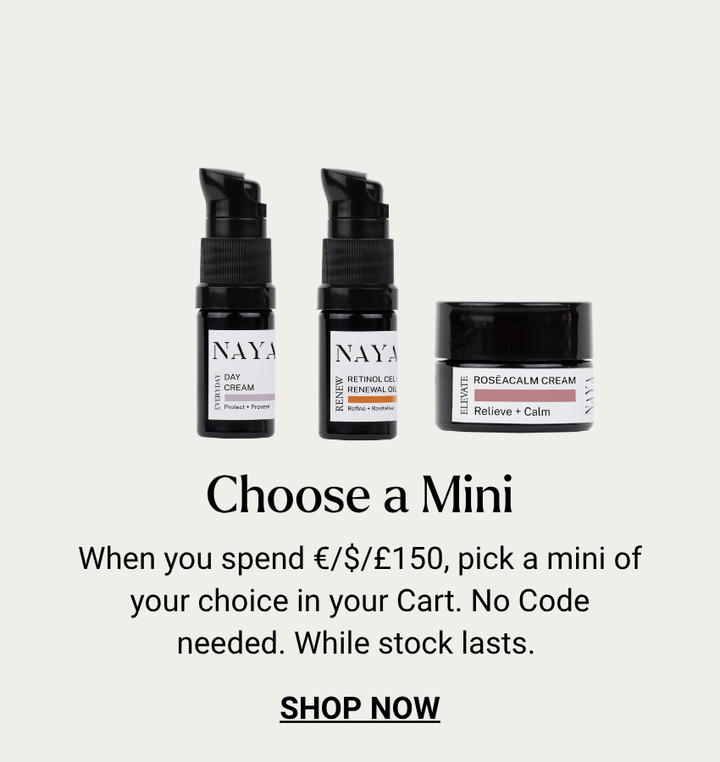NAYA's Ultimate Serum Guide: Find the Best Serum for Your Skin
Serum Guide: Find Your Perfect Facial Serum
No doubt, you need a serum. A serum is the key in addressing your skin focus and achieving your skin goal. But which serum is the right one for you? A highly concentrated skincare product like a serum can revolutionise your skincare routine with valuable ingredients, improving your complexion, plumping fine lines, brightening dark spots, and combating dryness. The key is to find the right serum for your skin.
What is a Facial Serum?
There are classic anti-aging serums, serums for dry skin, and even Vitamin C serums or Niacinamide Serum for the face, which are currently all the rage on social media. But what exactly is a facial serum? What’s behind it? Does everyone need a serum? And how do you find the right one for your skin?
In general, a serum is the key "tool" in your skincare toolbox to address your skin concern. While a serum is there to nourish and support your skin, it isn't its main focus. The serums focus is to address your skin problem. It's not a replacement for a cream and certainly not a replacement for a toner. But a great - and I would even say - a must-have if you want to address a skin problem. If you don't have a skin problem you want to address - lucky you! Majority of us have something they are not happy with and want to address it.
I say that serums don't replace the cream as they don't compete with each other but they complement one another. They need to be used together for the best results. A serum typically has a lighter texture than a cream but a higher concentration of active ingredients and more premium ingredients. A serum is always always water-based. If you read an oil-based serum - run. Run as fast as you can as there isn't an oil-based serum. If it says oil-based 'serum' it is a face oil. Full-stop. Brands love to confuse and create new name for products to reinvent the old. But don't get fooled.
Why is a serum a water-based formulation?
A serum is water-based formula so that it can penetrate deeper into the skin. And you want a serum to penetrate deeply into your skin as this is where the root cause of your problem lives that you want to address. Your skin problem doesn't sit on the surface of your skin but within your skin. And that's where it needs to be addressed to resolve your skin problem. An oil or where many brands refer to oil serum can physically not penetrate deeply. It is rich in lipids and will sit on your skin predominantly. But simply put, serums are power-boosters for beauty - and you want them to get straight to work so they are worth every penny. They’re ideal for targeting skin concerns and addressing specific facial skin needs. However, to unleash their full potential, the serum should be sealed into the skin, so it's best to follow up with a face cream or face oil.
Benefits of a Serum
- The light texture feels pleasant on the skin
- The typical serum formula absorbs quickly and deeply
- Just a few drops are enough to care for the face and décolletage
- The high concentration of ingredients makes serums rich boosters for the skin
- Serums can complement your specific skincare needs
- There’s a perfect facial serum for your everyday skin need
- Look out for premium ingredients and unique actives in the serum
When Does a Serum Fit into Your Skincare Routine?
As mentioned, serums penetrate the skin faster and deeper than face creams, so they should be applied before cream. After cleansing and any clarifying products, you start with the serum. You can also layer more than one serum if they are suitable for your skin need and your skin can tolerate it. However, the high concentration of active ingredients can cause issues, especially at the start. Thus, I would only ever suggest to use one serum. At NAYA, we are combining various actives to address a specific skin problem. I understand that NAYA is very unique in this way when it comes to skincare products. While other skincare brands mainly use one hero ingredient such as water-based Ceramides, Niacinamide, Vitamin C derivative, Azelaic Acid etc, and while these are great ingredients, only one ingredient cannot address your skin concern. Thus, our formulation protocol at NAYA is very unique as we combine different actives that complement each other to address a skin problem in a 360 degrees approach.
What to look out for when introducing a serum in your skincare ritual?
When introducing a new serum, start slowly and give your skin time to adjust. Remember, the skin has a 28 days skin cycle. For example, you can use the serum every other day or just once a day before applying it morning and night. This is especially important for serums with more complex ingredients like retinol, retinal or L'Ascorbic Acid. Additionally, not all active ingredients can be combined in high concentrations. Some mix better than others and create amazing skincare formulations.
Tip: Always patch-test a serum on the inside of your arm before applying it to your face. Be cautious when combining acid-rich serums with other acids, such as layering AHA/BHA serum with retinol.
After a brief absorption time, seal the serum into your skin with a moisturiser or face oil. This routine can be repeated both in the morning and evening once your skin has adjusted.
Choosing the Right Serum for Your Skin Concerns
The ingredients in the serum play a significant role when and how often it should be applied. Anti-pigmentation and antioxidant serums work best when applied in the morning as they protect the skin from environmental influences and free radicals. Anti-aging serums are great for the nighttime routine to support skin regeneration and cell repair. Hydrating serums for dry skin can be applied twice daily to provide optimal moisture.
So, it’s especially important to find a serum suited to your personal skincare needs to make the most of those extra concentrated ingredients.
How to Apply Your Serum Correctly
As you may have heard elsewhere, the order of applying skincare products goes from light to heavy textures. First, apply a lighter product, such as a toner / essence, followed by a serum, then follow with a thicker product like a cream or oil. Learn more about Layering skincare product here. This method helps the active ingredients absorb better into the skin. Moreover, creams or oils can "seal" a previously applied serum, allowing it to work even deeper into the skin.
You can apply a serum to both dry and damp skin. Don’t forget your neck and décolletage, which also need care. A gently formulated serum can be ideal for the delicate eye area, helping to revive tired skin. Take your time and tap the serum in with your ring fingers to gently awaken and brighten the eyes.
Choosing the Right Serum for You
How do you choose the right serum? With so many formulations, ingredient combinations, and products targeted at specific skin concerns, it can be hard to keep track. That’s why we’ve put together the ultimate serum guide to help you find the perfect skincare solution.
Some serums have a single active ingredient - they are a one trick pony and in my view lazy formulations and are unable to fully address your skin problem - without you having to purchase additional serums. I am no fan of one-ingredient story which is basically using one active ingredient in a serum and pushing it as this miracle ingredient. As so many things in life, it needs a careful balance of a varioety of ingredients, actives to address your skin problem. Depending on your goals—whether it’s protecting your skin from the first signs of aging or battling imperfections—you can choose from different formulations.
The Right Well Aging Serum
Many brands still market anti-aging serums. Since aging is neither something to prevent nor something negative, we prefer the term "Well Aging". Dermatologists and experts often recommend a combination of antioxidants, like Vitamin C, A, and E, to help your skin age well and healthy. These vitamins help fight free radicals, promote cell regeneration, and boost collagen production. Other serums targeting fine lines may also contain antioxidants, retinol, or niacinamide.
Fighting Pigment Spots and Discolouration with Your Facial Serum
Pigment spots and discolouration are common skin challenges. These issues can arise due to sun exposure, hormonal changes, or skin injuries, leaving the complexion uneven. This is the hardest skin problem to address in particular if you are caucasian. It will require a careful mix of a variety of ingredients and patience from the customer to see results. Results can take up to 3-6 months. Look for serums that contain:
Vitamin C: A powerful antioxidant that brightens the skin and evens out the complexion by inhibiting melanin production and protecting against environmental damage. Please make sure to use L'Ascorbic Acid if that is your goal. Vitamin C derivatives work differently to L'Ascorbic Acid. Learn more about Vitamin C derivatives here.
Niacinamide (Vitamin B3): Known for strengthening the skin barrier and lightening dark spots.
Alpha Hydroxy Acids (AHAs): Exfoliating acids that promote cell turnover and help remove dead skin cells, reducing discoloration.
Retinol/Retinal: A proven ingredient that encourages cell regeneration, fading dark spots over time.
Serum for Dry Skin
If your skin frequently feels dry, tight, or flaky, a hydrating serum is ideal. Active ingredients like hyaluronic acid, Vitamin E are often found in moisture-boosting serums.
Serum for Acne-Prone Skin
Serums for blemish-prone and sensitive skin often contain salicylic acid or similar plant-based derivatives. Niacinamide, Azelaic Acid and Exosomes can also help reduce blemishes and acne while soothing and hydrating the skin.
Smoothing Serum for Better Skin Texture
Products that improve the skin's overall appearance often use glycolic acid to remove dull, discoloured, and dead skin cells, revealing a smoother, brighter complexion.
Serum for Mature Skin
As we age, skin regeneration slows down, and collagen, elastin, and hyaluronic acid production declines, leading to sagging and loss of structure. A well-formulated facial serum can help support the skin's function and prevent signs of aging. Retinol, Exosomes and EGF are effective ingredients for promoting cell regeneration and boosting collagen production, which helps combat fine lines and wrinkles.
Serum for Sensitive Skin
Sensitive skin reacts strongly to certain ingredients, resulting in symptoms like itching, redness, burning, and dryness. In such cases, look for soothing, anti-inflammatory, and regenerative ingredients. We have an exciting new serums launching with a new premium active that is perfect to calm your sensitive skin and reduce redness while promoting a balanced microbiome.
NAYA Skincare Serums: Tailored Solutions for Every Skin Need
At NAYA, we offer a serum for every skin concern, type, and need. Whether it's deeply hydrating dry skin, defending against free radicals, preserving elasticity, smoothing fine lines, or refining skin texture, our range of serums has you covered.
The Everyday Glow Serum
For dull or blemish-prone skin, or if you experience redness, NAYA has developed the Everyday Glow Serum. This soothing formula with a unique glow complex and silverear mushrooms delivers deep hydration and supports skin elasticity. The blend of natural ingredients, such as algae extract, regenerates and strengthens, while vitamin e and vitamin c derivative provides antioxidant benefits.
The Antioxidant Defence Booster
To combat photo-induced skin aging and hyperpigmentation caused by UV rays, this antioxidant-rich serum helps protect the skin from free radicals. Key ingredients like L'Ascorbic Acid, Niacinamide, and protective desert algae ferment work together to prevent fine lines and dark spots, making it suitable for all skin needs.
Each NAYA serum is crafted to nurture your skin, offering luxurious ingredients and targeted care for visible results.

